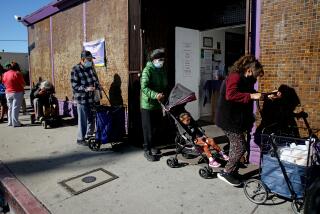Looking at the Homeless
- Share via
California has recorded significant achievements in the three years since it established a special program for the homeless who are mentally ill, but serious gaps are evident, according to a new study by the RAND Corp., commissioned by the state Department of Mental Health.
Two priorities have emerged: (1) the need for more alternative housing arrangements, to offer these homeless something in between living alone and rigid group living facilities, and (2) expansion of case management to address the lack of a continuum of service. Both of these needs, incidentally, were identified in the new Master Plan for Los Angeles County Mental Health Services issued in May, and a new program is being initiated to assign a professional to each case in an effort to ensure better oversight.
The RAND study has identified another problem with national implications. An estimated 27% of the homeless on Skid Row in Los Angeles, 26% in Orange County, are severely mentally disabled, and, of these severely mentally disabled, 69% on Skid Row in Los Angeles and 82% in Orange County abuse alcohol and/or other drugs. But there is only limited coordination between mental-health programs focused on the homeless and drug-abuse programs. The programs suffer from limited capacity because of the shortfall in resources, compounded by “weak interagency relationships.” The problem reinforces the need for improved case management.
Numerous questions were left unanswered by the study, including a clear picture of whether the number of mentally disabled homeless people is growing, the proportions of episodic homelessness as opposed to those who are without homes for long periods, and the means of reducing homelessness among those who are mentally disabled. When those answers are known, the state will be better able to serve this population. But the RAND report makes clear that there is much to be done now in terms of providing more adequate funding that, in turn, will buy sorely needed housing and improved case management.
More to Read
Sign up for Essential California
The most important California stories and recommendations in your inbox every morning.
You may occasionally receive promotional content from the Los Angeles Times.










